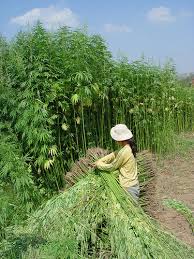FAQ'S
You have hemp questions? We've got answers.
Welcome to our FAQ page where you can find answers to all your Frequently Asked Questions. Explore our comprehensive list of FAQs covering a wide range of topics and queries. Whether you're looking for information about our products, services, policies, or anything else, this page has got you covered. Our aim is to provide you with accurate and relevant information to help address any concerns or doubts you may have. Browse through this page to find the answers you need and feel free to reach out to us if you have any additional questions. Thank you for visiting our FAQ page!
1.) What is hemp?
Industrial hemp is in the same family as Cannabis Sativa. Industrial hemp is used for a multitude of applications including: clothing, building materials, paper, soap/lotions, twine, rope, webbing, food and more...
2.) What does Industrial hemp look like?
Industrial hemp grown for textiles averages 8-12 feet high, is long and skinny and grows very densely together similar to corn. Hemp grown for grain averages a height of around 6 feet or lower. The picture below depicts an average industrial hemp field being grown for textile use.

3.) What is the difference between hemp and medicinal marijuana?
Hemp is grown for industrial applications only, not medicine. Many people confuse the term hemp to describe medicinal marijuana, this is not the correct term for hemp. Industrial hemp contains only .3%-1.5% THC. Therefore, hemp can not be smoked to gain a high or contain any type of psychoactive properties. Additionally those farmers growing hemp are required to have their fields tested annually for THC by the government and are sent to a lab testing facility.
4.) Which states can grow hemp?
Twenty (20) states have defined industrial hemp as distinct and removed barriers to its production. These states will be able to take immediate advantage of the industrial hemp research and pilot program provision, Section 7606 of the Farm Bill: California, Colorado, Delaware, Hawaii, Illinois, Indiana, Kentucky, Maine, Missouri, Michigan, Montana, Nebraska, New York, North Dakota, Oregon, South Carolina, Tennessee, Utah, Vermont, Washington, and West Virginia. For more information about hemp legislature and advocacy visit Votehemp.com
5.) What countries can grow hemp?
Australia, Austria, Canada, Chile, China, Denmark, Finland, France, Germany, Great Britain, Hungary, India, Italy, Japan, Netherlands, New Zealand, Poland, Romania, Russia, Slovenia, Spain, Switzerland, Turkey, Ukraine, Egypt, Korea, Portugal and Thailand. The U.S. is the only industrialized nation in the world that does not recognize the value of industrial hemp and permit its production on a federal level.
6.) Why are some of your hemp fabrics and hemp products made in China?
Hemp has been grown in China un-interrupted for centuries. This they have the most sophisticated machinery and farmland dedicated to hemp fiber. When it comes to hemp fiber most all hemp fabrics come from China especially finer knit wear. You can still get hemp canvas and other types of more greige fabric and not as refined from Romania or other parts of the world. However, the best hemp fabric and production comes from China. Also, when our twine is being made there it is being made by machinery equipment with only one or two people that walk around and make sure that the equipment has not ran out of yarn and simply replace the yarn thread it through and push the start button on the machinery to operate again. Contrary to popular belief that China is sweatshops, most of our products are actually made from machinery doing all the work. Below is a picture of Taishan Mountain when I was there several years ago and the hemp growing wild and freely near the base of the mountain. Something you would not see in the United States due to the legalization of Marijuana Cannabis Sativa. In China medicinal and recreational cannabis sativa is forbidden and strongly regulated. However, hemp is common as an agricultural crop.
7.) Where can I learn more about hemp and it's many uses?
If you would like to learn more about hemp we suggest purchasing one of our great books or DVD's, checking out the Hemp Industry Association website, Votehemp or getting involved with Hemp History Week.
8.) If I wanted to make a hemp product who would I contact or learn more about doing so?
We have partnered with companies and factories here in the United States and overseas. We can aid in the development of your product by providing knowledge of which type of yarns to use, material consistency and design. You can contact us at teamhemp@hemptopia.com to discuss your project and product application. We also have a page on our site which explains custom manufacturing and private label opportunities.
9.) How long have you been in the business of Hemp?
We started in 2005 with an idea to make hemp clothing thinking it would be "cool". Since then we have gained a tremendous wealth of knowledge about hemp and the industry itself. After realizing all the beneficial properties of hemp we decided to start designing around functionality and sustainability. Industrial Hemp is not only beneficial to our planet Earth but also to ourselves as humans. Providing fiber for yarn, seeds for dietary supplemental protein and so on.
10.) If I eat hemp seeds will it show up on a drug test?
No, if you apply hemp seed or oil into your daily diet you will be providing your body 15 grams of raw organic protein and 8 grams of fiber. Hemp also contains all nine essential amino acids including essential fatty acids which are very beneficial.
11.) I just bought some hemp seeds/oil, now what?
Great, you can put them in salads, cookies, smoothies, yogurt, or eat straight out of the bag. You can infuse almost every type of meal with hemp seed or oil for a more balanced daily diet.
12.) Do you offer an affiliate program?
Yes, we do. Contact us to set up a wholesale account and fill out our affiliate program form. We can blind ship to your customer and include your packing slip or invoice. We also offer a sales commission on orders placed with us. Our commission rate is 10% of the gross sale not including the shipping cost.
13.) Why is hemp more expensive?
Hemp is more expensive because there is only a limited amount of hemp being grown and the process to produce hemp yarn is longer than that of cotton or chemical fibers. It is similar in regard to silk. Hemp holds higher environmental and personal benefits, therefore you pay a little more for a better quality product. Which in turn lasts longer, so in reality is less expensive.
If you have any other questions, please feel free to shoot us an email at: teamhemp@hemptopia.com and will be happy to answer any more questions.


